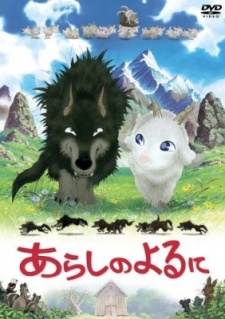
I'm not sure this is the right time for me to review Arashi no Yoru ni. After last weekend's fight between white supremacists and antifacists I'm not feeling particularly generous towards looking at both sides of a conflict, and given a story about wolves who eat sheep and sheep who, well, fight and run away from wolves who want to eat them, there's barely a degree of separation for me right off the bat. Add to that the fact that two friends on opposite sides of the Charlottesville conflict need to be having a pretty serious conversation right about now, and the fast friendship/pseudo-romantic bond between Mei the sheep and Gabu the wolf leaves me feeling like there was a step or two missing. For those who'd rather I avoid getting swayed too much by worldy affairs though, I promise the same issues would've bugged me on any other day, because they've set up a fairy tale story for these two, and framing it are a lot of emotions that aren't compatible with their dream world.
The first three scenes are a pretty clear showcase of this incompatibility, and so right from the twenty-minute mark or so the movie already feels a bit misplaced. First is the hunt which kills Mei's mother, a brutal slaughter framed in a dying grassland in a storm. Mei's mother resists and even tears an ear off one of the wolves, which may be where Mei's strong will and courage comes from, but still it seems like a pretty traumatic experience for a young kid (no pun intended), and while they claim later that Mei had run far enough away to not watch there's still a pretty strong emotional punch there. Fast forward to a storm, where Mei takes shelter in the same dark barn as the wolf Gabu. They talk and bond over their many similarities, the darkness hiding their species and the phrasing keeping them from figuring out what the other means by “my favorite meal”. Lightning bolts routinely threaten to show themselves to each other, which builds the tension of how their new friendship will fall apart. A scene later they meet for lunch; after all of twenty seconds of surprise at each other, they start walking along as if they were joined at the hip, Mei not distrusting Gabu in the slightest and Gabu barely licking his chops over his favorite meal, who he talked to for all of ten minutes.
So which is it? Trauma, suspense, or just plain friendship? Admittedly once those scenes pass and they are well-established as friends their story is fairly heartwarming, refusing to give each other up to their home tribes and eventually running away together, helping each other survive the cold mountain peaks. We get some flashbacks from Gabu showing how tough his “friends” were on him at home, so maybe we can believe where the kindhearted and trusting Mei led him to betray his instincts. But Mei just seems to ignore his fellow sheep, lying to them and ditching his friends for Gabu at the first sign of trouble. And twice he offers himself as a foodstuff to help Gabu survive, which takes a considerable assumption about Mei's take on life, let alone his very recent wolf friend.
The escape and chase forms the meat of the story, with the two of them crossing atop a mountain that seems to cut the cycle of wolf and sheep off from a more peaceful world beyond. The environments here are well done, a spacious and colorful backdrop to the more rugged character designs of Mei and Gabu. They both put themselves on the line for each other, get separated, and live on in anguish for a time apart. Besides a cute and impenetrable bond of friendship—possibly even a bit more, for their sentiments about living life without each other—there's nothing substantive here. The denouement throws one more wrench in the mix, about memory loss and reminiscing about that stormy night they met, validating the title once again. It doesn't seem necessary though; in fact it seems more like a way to fabricate drama into the last few minutes.
I certainly think there's a crowd that can enjoy Arashi no Yoru ni, particularly a crowd that's more forgiving of the context for the sake of their bond. Gisaburou Sugii was certainly the right man to take on a serious animal story, with his two Kenji Miyazawa adaptations Night on the Galactic Railroad and The Life of Guskou Budori switching out humans for cats to add a dreamlike layer to a colder reality. But for a story taking on such topics as the cycle of consumption, the happy-go-lucky attitude of Mei and Gabu's rough Edo dialect tend to ruin any moments of tension, and so the whole movie only works along the axis of watching the two of them grow towards one another. I sometimes think about how it would be if writers messed with the variables of typical stories, and the star-crossed friendship is certainly a typical story, but I'd say they messed with the wrong variable here.